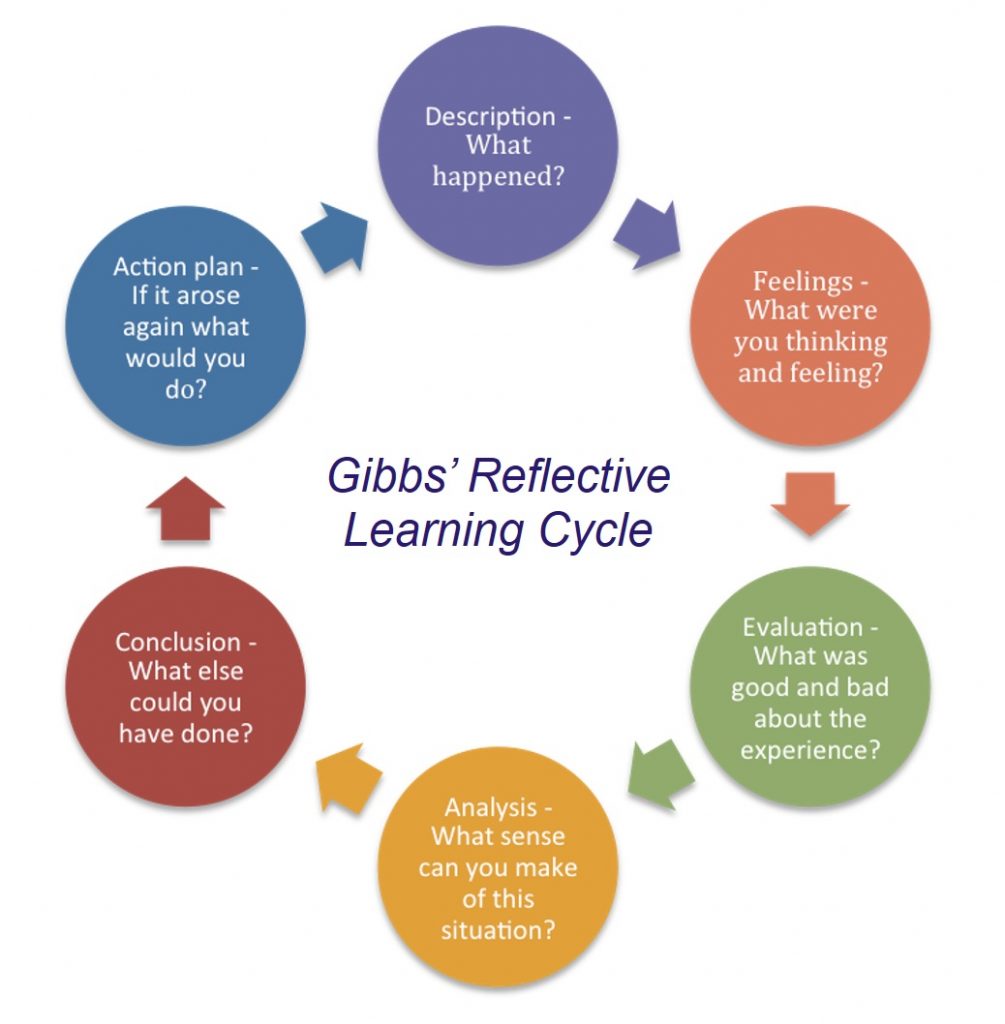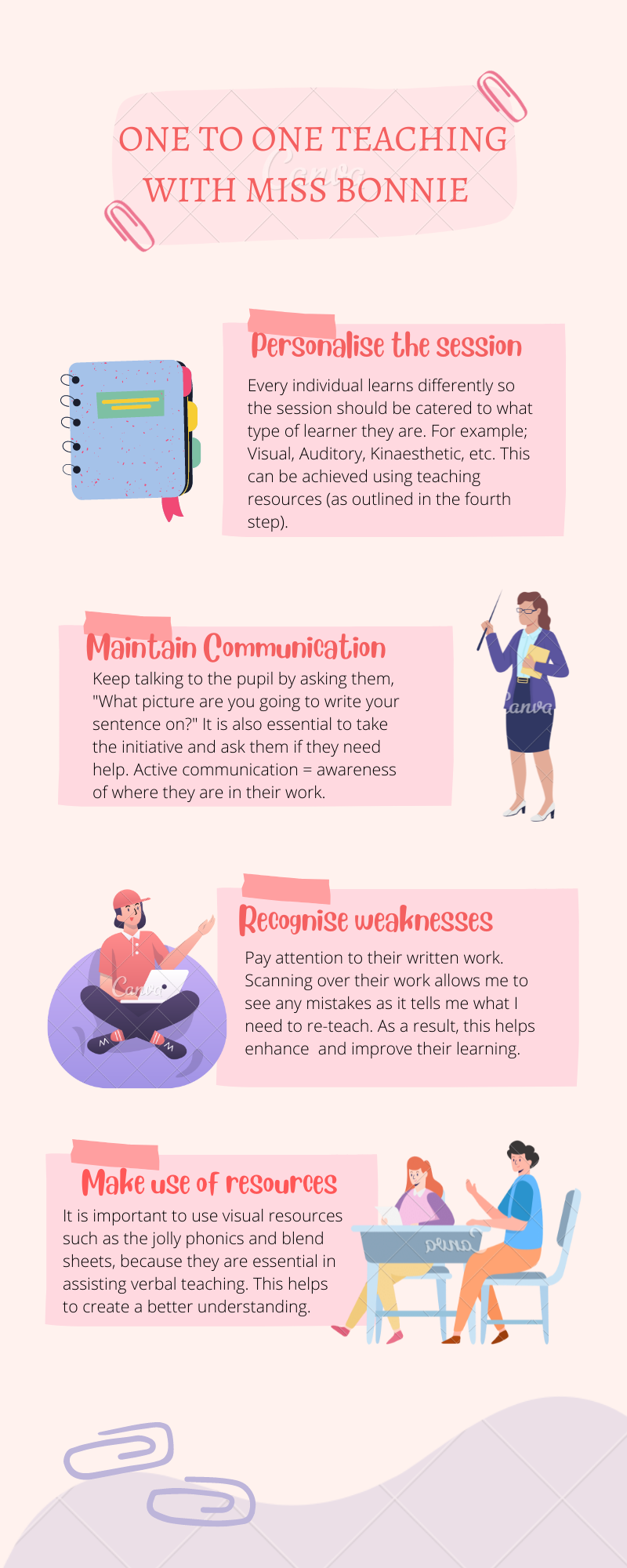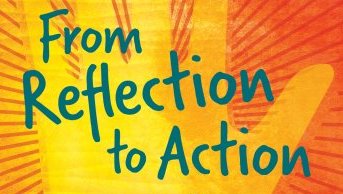The Teacher Toolkit

It’s been six months since I first stepped into Carhill Integrated Primary School and ever since I have grown progressively as a teaching assistant, using each experience to reflect on my skills and teaching techniques. I guess you can say I have established my own teacher toolkit.
I have faced many challenges in my placement but I believe this recent learning experience has impacted me the most. In this blog post I will use Gibbs Reflective Cycle to reflect on the challenges I faced supporting primary one pupils on their initial experiences of forming and writing sentences.
Description
After the teacher had finished reading to a group of primary ones, they were then asked to write a sentence related to the book. The pupils then read through the book and chose from the list of foods that appeared in the story. They then began to write their sentences and this is where I came in. My role was to assist and provide help as they try to form sentences on their own.
Feelings
From the moment I was asked to do this, I knew it was going to be challenging experience because I felt I held quite a tremendous responsibility in their learning development. So, I thought to myself- where do I begin? This wasn’t because I was nervous, rather it was more on the fact that how I teach these children will contribute to how they retain information. Although to a certain extent, I was quite confident and reassured, I was still double thinking and contemplating how to approach this in the best possible way (the joys of trying to be a perfectionist). However, I felt prepared as previous experiences enhanced my retention of easy to understand terminology, and combined with secondary readings I became confident with my performance.
Evaluation
Reflecting back, I am pleased with my readiness and preparation. The class teacher notified me two weeks prior that the primary ones will begin to learn more new words in preparation for forming sentences. To prepare for this I took note of Teresa Cremin and James Arthur’s tip that highlights the importance of having “knowledge of specific techniques to facilitate learning,” (25) when teaching children. So, I applied this in my teaching when I helped the pupils form certain words. Specifically, ‘jelly’ as it was the most popular word used in their written work. I sounded and imitated the action of the word which helped enhanced understanding, thanks to the help from the Oxford Owl where they identified the importance of composing, “a sentence orally before writing it,” (https://home.oxfordowl.co.uk). This teaching was effective as pupils were stimulated and joined in on imitating the action and sound. And it was in this moment, I found out I was a jolly phonics connoisseur (Ok, maybe I’m getting ahead of myself). Something else that was effective was the use of teaching resources such as jolly phonics and vowel blend cards as most pupils became confident to use them to form sentences on their own.


Another plan that went well was the one to one teaching I had with each pupil. The varying learning levels meant that some pupils required more help than others because they need more time to understand a concept. This teaching method helped each pupil feel heard as the level of help they need is met and allowed an opportunity for them to ask me questions. More detail can be found on this infographic on your left that I had created using Canva.
However, upon reflection I realised I spent longer with certain children in the one to one teaching. This meant teaching time was unfairly distributed and so, as a result some pupils had a better learning experience than others. I now recognise that it was a drawback to these pupils’ true potential.
Analysis
Analysing my experience, I knew that the smooth sailing lesson I lead was mostly due to my preparation studies. Through secondary readings I was able to use their advices and incorporate it in my own teaching lesson. In analysing it is extremely importance to read not for the sake of reading, but as a learning experience to enhance my personal knowledge and abilities. Not only will I learn, I will inspire others around me to grow too. Carole Spiers states, “Preparation is essential, not optional,” (https://executivesupportmagazine.com), and I cannot stress this enough! Being able to put my readings into action is the art of becoming a well-rounded teacher with her own established teaching toolkit. This experience gave me an opportunity to see myself as a prepared teacher who is infused with secondary readings. This also made me realise how effective my teaching methods were and allowed me to see and re-assess the one to one teaching method.
Conclusion

I have learned that putting reading into action allows me to recognise the improvements needed for exceptional teaching. Reflecting back, something else I could have done differently was to use the clock to measure time spent with each pupil. This will ensure fair teaching is provided for every pupil.
I realise now, that a more positive situation would have been putting the pupils into pairs. This will be more time efficient and will also improve my multi-tasking skills, so to conclude, moving forward I hope to become an efficient planner.
Action Plan
If I use the one to one teaching method again, I would be careful with how much time I spend with each pupil. My action plan also includes the continue use of the sounding and imitating method as this resulted in a good reception but, I will also incorporate praises such as, “very good!” to encourage them to keep working. This idea is motivated by Andrew Pollard who highlights, “Praise needs to be natural and sincere,” (220). So, I will definitely take this into account when I use praise in future lessons.
Bibliography:
Primary Sources:
Arthur, James and Cremin Teresa. Learning to Teach in the Primary School. Routledge, 2014.
Pollard, Andrew. Readings for Reflective Teaching. Continuum, 2002.
Secondary Sources:
Oxford Owl. “Writing in Year 1 (age 5-6).” Oxford University Press, 2022, https://home.oxfordowl.co.uk/english/primary-writing/writing-year-1-age-5-6/ (Accessed 8th March 2022).
Spiers, Carole. “The Importance of Preparation.” The Executive Support Magazine, 25 November 2017, https://executivesupportmagazine.com/the-importance-of-preparation/ (Accessed 13th March 2022).
“Meet the New Sub, Alice.”
You May Also Like

Reflection-In-Action: The Value of Challenges
25 March 2022
27 March 2022

